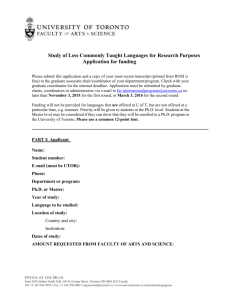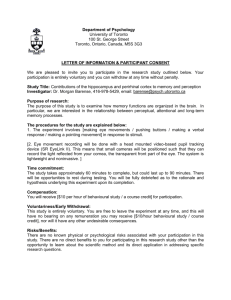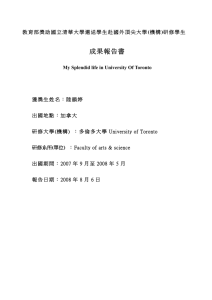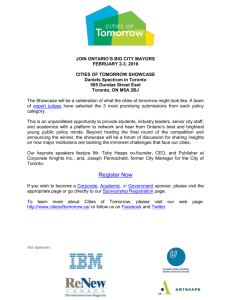UTSU Drop Credit Policy - University of Toronto Students' Union
advertisement
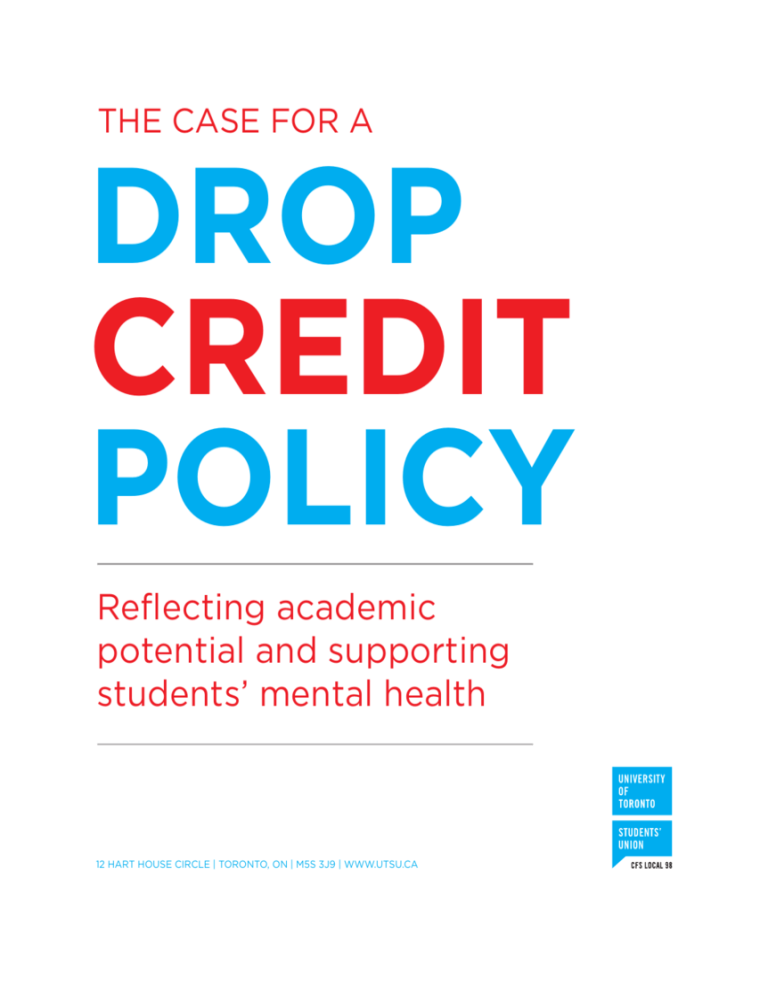
THE CASE FOR A DROP CREDIT POLICY Reflecting academic potential and supporting students’ mental health 12 HART HOUSE CIRCLE | TORONTO, ON | M5S 3J9 | WWW.UTSU.CA RECOMMENDATIONS FOR AN ENCOURAGING UNIVERSITY ENVIRONMENT 1 4 ROSI.UTORONTO.CA Continue to allow students to retake multiple courses (application across all faculties) Make the process simple and accessible through ROSI or NGSIS 2 5 % % If a second or subsequent attempt at a course reflects a higher academic achievement: a.) Eliminate the first attempt from the student’s transcript & b.) Use the second attempt in the CGPA calculation ENROLMENT Provide academic appeals and Drop Credit Policy information to students upon enrolment in the university and in courses through ROSI or NGSIS 3 6 Allow students to apply these policies at least three times over the course of their undergraduate years Develop a university-wide practice for making multiple attempts at courses INTRODUCTION TABLE OF CONTENTS: The University of Toronto Students’ Union (UTSU) represents over 47,000 full-time undergraduate students at the University of Toronto (UofT) St. George and Mississauga campuses. The UTSU works to ensure that undergraduate students receive the most out of their education, that their rights are protected and that they have the best possible student experience. OVERVIEW Student stress and student success 2 The UTSU Executive Committee was elected with a mandate from the membership to work with the University to relieve students’ mental health concerns. This report introduces a Drop Credit Policy STUDENT EXPERIENCE recommendation for the University. This change in academic policies will better reflect students’ academic achievements, and recognize the fact that failure to achieve academically can be linked to unique personal hardships that students may be facing. University demands and performance3 Students’ mental health4 The case for a drop credit policy 5 THE APPEAL PROCESS AT THE UNIVERSITY OF TORONTO: Existing policy and improvements6 DROP CREDIT POLICY OUTLINE8 OTHER SUPPORTING INFORMATION FOR DROP CREDIT POLICY: Institutional Credibility 9 CONCLUSION Recommendations11 Final recommendations12 Sources14 UNIVERSITY OF TORONTO STUDENTS’ UNION THE CASE FOR A DROP CREDIT POLICY STUDENT STRESS AND STUDENT SUCCESS Drop Credit is unobtrusive The Drop Credit policy allows students the ability to address academic issues without the expectation to disclose the complex personal realities that may have caused poor performance. Academic success is linked to external factors that extend beyond the borders of the University. Students’ academic performance is linked to their household education, socioeconomic status and various other external factors. One of the University of Toronto’s goals for undergraduate students is to deliver high quality teaching and learning opportunities accessible to students from diverse backgrounds and in diverse disciplines. However, students at our university continue to face challenges that hinder their academic success. This report focuses on the acute problem of mental health that can significantly impact the students’ learning experience and thus their academic success. “[t]he unique demands and stress that young adults face in making the transition to university may increase the risk for developing any number of mental health concerns” (CAPS, 2013). The level of stress students face during their time at university is substantial and can affect their academic performance. It is fundamental that an educational institution responds to the needs of individuals who The Drop Credit Policy complements the Appeals Process. stumble along the way. The University must have a proactive approach that will alleviate students’ stress so that the issues students are facing do not become compounded by academic mishaps. The University of Toronto Students’ Union has developed this report to make recommendations for a proactive approach that will recognize mental health as a significant issue and that will provide all students a forgiveness policy that may help reduce their stress levels. Currently, UofT’s academic appeal policies include strict procedures for students to repeat a course and complex, somewhat intimidating procedures to contest a grade. These policies do not take into account students’ mental health concerns and may not be accessed by students who feel anxious, inadequate or are experiencing other mental health complications. The process is restrictive and final grades may not be Drop Credit relieves student stress The policy is a proactive approach to the academic effects of mental health issues and will allow students’ GPA to more accurately reflect academic performance and potential. 1 UNIVERSITY OF TORONTO STUDENTS’ UNION included in students’ final GPA calculation. Our report recommends a policy that will complement the current procedures and allow students to eliminate three grade attempts from their transcript, colloquially called the “Drop Credit Policy.” This policy will relieve student stress, will be a proactive approach to the academic considerations of mental health issues and will allow students’ GPA to more accurately reflect academic performance and potential. THE CASE FOR A DROP CREDIT POLICY 2 UNIVERSITY DEMANDS AND PERFORMANCE STUDENTS’ MENTAL HEALTH As one of the highest-ranking universities in the world, UofT has very high academic standards for its While adjusting to a new life and meeting the University’s academic demands, many students face extensive students but arguably lacks the necessary support for students who may be struggling with mental health mental stress and fall behind in various parts of their university life. For a majority of students the transition issues. According to the National Survey of Student Engagement (NSSE), the indicator “Level of Academic from high school to university can be overwhelming. Some students are living alone for the first time and Challenge” at UofT is higher than our Canadian peers for first- and upper-year students (NSSE, 2012). The have moved away from social supports in their town or home country. Not only are students expected level of challenge is overwhelming for some students and may affect their academic performance and to adjust to a new style of education, they also face new responsibilities in order to sustain their living mental health. According to the NSSE’s measure of Supportive Campus Environment, UofT scored lower expenses and manage socially. Counseling and Psychological Services (CAPS) notes that factors such as than its peer universities. This measure includes “support [students] need to help… succeed academically separation from family and friends, financial burdens and academic demands have significant impact on and non-academic responsibilities,” which is exceptionally low for first-year students (NSSE, 2012). Students students’ emotional and psychological health (CAPS, 2013). These realities can affect academic performance require a welcoming and supportive environment that does not promote elevated levels of destructive and lead to a cycle of difficulties and disappointments in students’ personal and academic lives. The cycle stress and helps them to meet educational demands. The data demonstrates that students may not have the of disappointments in academics can lead to significant stress, magnify existing issues and ultimately necessary support to become involved in their community, create a supportive social network or succeed encourage or cause serious mental health issues. academically. Students face enormous amount of challenges as they attempt to comprehend large volume of information Counseling and Psychological Services describes depression as “a serious health problem that requires professional treatment…[that] can interfere with a person’s ability to carry out normal daily activities and in a short span of time. The high demand takes students away from the enriched experience UofT can offer. affect their relationships with others” (CAPS, 2013). Students may also face anxiety—“a feeling of uneasiness, This is further complicated by the high cost of education, as more students have no choice but to work apprehension or tension…in response to a real or perceived threat.” Other mental health problems that while studying full time, and are expected to do just as well as their wealthier peers. Some simply do not have the time to supplement their rigorous academic demands in the classroom with hands on learning have detrimental impact on the students’ education noted by the University include but are not limited to: bipolar disorder, obsessive-compulsive disorder, problem gambling, problems with sleeping, psychosis, opportunities, let alone the social, mental and physical supports they require outside the classroom. The substance abuse and disordered eating (CAPS, 2013). NSSE report shows that from 2004 to 2011, the University ranked lower than its peer group in the “Active and Collaborative Learning” indicator (NSSE, 2012). There is a significant gap between what is expected of students and the type of supports provided. Our students need adequate, accessible, and effective academic and non-academic support. The University of Toronto Students’ Union hears from and assists a high volume of students suffering from mental health issues due to academic stress. Data received from the Students’ Union supplementary health insurance plans tell us that a significant number of students at UofT take anti-depressants prescribed by their doctor on a regular basis in order to deal with the mental health issues. Sometimes, side effects of treatment for mental health issues can hinder their success and trigger further problems. The University’s ability to adequately address these issues should be examined. For example, the students’ union recently assisted a student who was prescribed medicine to treat a mental health issue. The side effects of this medicine impacted the student’s ability to think clearly and concentrate on their work. When the student presented their medical documents to the University for special consideration, they were only granted extensions for term work. This solution proved inadequate to assist with this student’s situation. This resulted in a poor performance record on the student’s transcript. Ultimately, the student was removed from their program of study because they were unable to complete the necessary courses in the required timeline. Rather than receiving support, which would help them navigate their academics given their mental health issues, the student spent over a year attempting to eliminate poor performance records from their transcript that they were unable to avoid. 3 UNIVERSITY OF TORONTO STUDENTS’ UNION THE CASE FOR A DROP CREDIT POLICY 4 This example is just one of many students we have assisted who find themselves in difficult academic situations perpetuated and magnified by mental health issues. It is likely that there are more students who EXISTING POLICY AND IMPROVEMENTS are affected in this manner that have not reached out to the students’ union or to CAPS. Our students need Currently the University of Toronto allows an appeal process for students allowing them to repeat passed a better process to address these issues academically, which recognizes their difficulties, does not make the courses. Many faculties at the University do not clearly state the specific rules for repeating a course. Those problems worse and allows them a fair opportunity to reach their academic goals. that do outline repeat policies often include strict restrictions, which may deter or prevent students from THE CASE FOR A DROP CREDIT POLICY accessing these policies. For example, according to the Faculty of Arts & Science, currently students—both degree and non-degree—“may not repeat any course in which they have already obtained credit (i.e. a mark of 50% or higher or CR)”. Post-secondary education is a means for students to achieve their goals. Students’ CGPA is important for their undergraduate degree, for future academic opportunities and will potentially chart the course for the remainder of their professional and personal lives. A poor grade in even one course can permanently affect a student’s CGPA. The NSSE performance indictors show that graduation rate at UofT have declined for registrants from 2001 to registrants from 2005 graduating by the end of their sixth year. The NSSE data comparison also shows that the graduation rate at UofT is lower than its Canadian peers (CSRDE, 2012). This trend could be attributed to a number of factors, including increasing fees, increasing class sizes and increasing opportunities outside of academics. These factors could contribute to mental health complications, and if more proactive supports for students experiencing mental health issues could prevent academic failure, the University should do everything that it can to provide such supports. Students may repeat a course only: •• If they need to achieve a minimum grade for entry into a limited-enrolment program •• If they need a certain grade for meeting a prerequisite to another course in their program •• If the repeated course is designated as “Extra,” which means the grade repeated course will not be included in GPA calculation or in the degree credit count •• If a student has not used the repeat option for prerequisite needs or for program enrolment, and have other reasonable circumstances approved by the Faculty. The repeated course will appear as “Extra,” and will not be included in GPA calculations or degree credit count. Failure to achieve academic expectations can have detrimental effects on the students and their future. The current repeat policy in the Faculty of Arts & Sciences has very limited options available to students Policies that recognizes the complex realities facing young adults today and provide a true picture of their in terms of repeating passed courses. Affected students are also required to go through difficult and academic abilities is necessary in order to relieve student stress. Consequently, allowing a student to remove intimidating processes in order to access their options. For failed courses, students are advised to contact three poor marks will allow students to encourage students instead of demoralizing them, which happens their registrar’s office. It is mandatory for students to meet with academic advisors at their respective when students are restrained due to poor grades. colleges in order to make their request. This is similar to how the late withdrawal policy is exercised at the University. Overall, the policies are filled with complications, they are time consuming and most importantly they are stressful for students, and are a source of anxiety and frustration. The University of Toronto Students’ Union recommends a policy that is friendly for students, faculty members and for the administration. The policy we propose will allow students to repeat a failed course or course in which they have received a very low grade. The current system involves a stressful process of filing petitions that are restricted to specific situations and filled with uncertainties, which may result in stress and further complicate students’ poor performance and mental health issues. The policy we propose will allow students to adjust plans according to their personal situation without requiring them to disclose information they may be uncomfortable discussing. The policy we propose will also only show the highest mark that the student earns in their transcript, ensuring that students will not be penalized throughout their academic careers by atypical academic results. We also recommend that the approval process to repeat a course be simple and non-invasive. We recommend that the policy be automatically recognized through the UofT Student Web Service: ROSI. 5 UNIVERSITY OF TORONTO STUDENTS’ UNION THE CASE FOR A DROP CREDIT POLICY 6 DROP CREDIT POLICY OUTLINED What is the Drop Credit Policy? This policy allows students to repeat courses to eliminate poor performance and to achieve a mark that is representative of their academic potential. We recommend that the Drop Credit policy allow students the ability to eliminate up to three courses of their choosing from their academic record. These marks will be eliminated from their transcript and their sessional, program, cumulative and overall GPA. Students will be able to repeat their course as though it had not been taken before. This provision should apply to all past courses that a student chooses to retake, as well as program credits. What is the scope of this policy? We recommend that students be able to drop up to 3.0 credits (3 full year or 6 half year courses) regardless if they have passed or failed the course(s) in the past. Many students often get caught in the cycle of academic success 7 UNIVERSITY OF TORONTO STUDENTS’ UNION THE CASE FOR A DROP CREDIT POLICY 8 INSTITUTIONAL CREDIBILITY There has been some concern that a policy like this will affect institutional credibility. It should be understood that this type of policy exists at other research-intensive institutions similar to the University of Toronto, and has not affected their credibility. Also, the Faculty of Law at the University of Toronto Institutional Credibility and the Value of Education Some of the concerns surrounds upon the credibility of the University of Toronto and the students’ transcript. Here we look at these credibility concerns and their viability. 1. Is the implementation of this process lengthy and costly? has a similar policy (though not exactly the same) called Aegrotat. The University of Toronto Law School is considered one of the best in Canada. Providing students with this type of policy to support them academically and with mental health issues will not affect the rigorous academic expectations of the institution. It will simply ensure that students are well supported and that students’ CGPAs are a more accurate reflection of their academic potential. a. Implementation will be very simple and quick via ROSI 2. Can students abuse the Drop Credit system? a. The policy will ONLY be allowed for student to retake three FCE meaning three full year course or 6 half-year courses. Students are unlikely to have taken the decision to attend post-secondary education lightly. Poor academic performance is typically linked to other factors in students’ lives. Students are unlikely to abuse this system. The University must have a proactive approach that will alleviate students’ stress so that the issues students are facing do not become compounded by academic mishaps. 3. Will this create an unfair advantage for students? a. This policy should be applied to all students, preventing the possibility of unfair advantages being provided to some students. 4. Is this different from the Credit/No Credit Policy? a. This is completely different from the Credit/No Credit Policy. Students will be able to drop courses completely and will be able to repeat these courses for evaluation to be recorded on their transcript. 5. What benefit is there for the University to adopt this policy? a. This policy will be a proactive approach to students’ mental health concerns. There is currently no policy that unobtrusively assists students whose mental health issues have affected their academic performance. This will also be a better reflection of students’ academic potential and will prevent The 2012 National Survey of Student Engagement data comparison shows that the graduation rate at UofT is lower than its Canadian peers (CSRDE, 2012). atypical marks from having a large affect on students’ CGPA. 9 UNIVERSITY OF TORONTO STUDENTS’ UNION THE CASE FOR A DROP CREDIT POLICY 10 FINAL RECOMMENDATIONS FINAL RECOMMENDATIONS IN DEPTH 1. Continue to allow students to retake multiple course (application across all faculties) 1. Continue to allow students to retake multiple course (application across all faculties) 2. If a second or subsequent attempt at a course reflects a higher academic achievement: Academic performance is tied to realities that extend beyond the borders of our campuses. Academic performance has been linked to household education levels, socioeconomic status, mental health and factors a. Eliminate the first attempt from the student’s transcript that are external to the student and their institution. By continuing to permit students to repeat courses, the University implicitly acknowledges that individual circumstances can have a negative impact on academic b. Use the second attempt in the CGPA calculation 3. Allow students to apply these policies at least three times over the course of their undergraduate years performance. Multiple course attempts are a means of ensuring students with extenuating circumstances can progress in their academic careers. 2. If a second or subsequent attempt at a course reflects a higher academic achievement: 4. Make the process simple and accessible through ROSI or NGSIS a. Eliminate the first attempt from the student’s transcript 5. Provide academic appeals and drop credit policy information to students upon enrolment in the university an in courses through ROSI or NGSIS b. Use the second attempt in the CGPA calculation a. Academic success ought to be formally recognized. If a student has demonstrated a particular level 6. Develop a university-wide practice for making multiple attempts at courses of academic achievement and potential in a course, their efforts should be reflected in their academic transcript. The CGPA and the transcript are the records of formal recognition of academic achievement. By committing to reflect the improvement of performance on both students’ CGPAs and transcripts, the University would honour its commitment to recognizing academic achievements. It would also help to ensure that students are not penalized for extenuating circumstances and individual hardships. 3. Make the process simple and accessible through ROSI or NGSIS Students will respect this policy and apply it with care if there are limits placed on its use. We recommend that three applications of this policy be provided to students over their entire academic career to ensure fair use of the policy. Without limitations, students who can afford to retake courses could abuse this policy and improve their CGPA and transcripts substantially. The limit of three attempts makes the policy flexible to accommodate for students with ongoing extenuating circumstances negatively impacting academic performance. 11 UNIVERSITY OF TORONTO STUDENTS’ UNION THE CASE FOR A DROP CREDIT POLICY 12 CONCLUSION 4. Make the process simple and accessible through ROSI or NGSIS Application of this policy should focus on neutrality and accessibility. It should be passive, non- The Drop Credit Policy is necessary. The academic record should reflect performance fairly and equitably confrontational an unobtrusive for the student. Applying for a replacement course should be as simple as across the University. Students are often negatively impacted by circumstances outside of their control. In applying for a course through ROSI or NGSIS. resolving their personal hardships, students should not have to face additional barriers from their university. The Drop Credit Policy supports students with extenuating circumstances such as mental health concerns By using the systems already in place such as ROSI or NGSIS, the Governing Council would avoid the pitfalls or family emergencies by affording them the academic flexibility necessary to ensure academic success in of implementing a complex, intimidating application procedure that replicates the length, frustration and times of distress. anxiety associated with the current academic appeals process. 5. Provide academic appeals and Drop Credit Policy information to students upon enrolment in the university an in courses through ROSI or NGSIS By adopting the Drop Credit policy, the University of Toronto would be demonstrating its support for students at-risk before they slip through the cracks. From our research and interactions with our members, we have learned that students are generally uninformed about the appeals process. Typically, students only come to know the appeals process some SOURCES time after an academic issue arises. By promoting the policy through an online student registration system, every student would be aware of the policy and would be more likely to understand and not misuse it. 1. http://www.artsandscience.utoronto.ca/ofr/archived/1314calendar/Rules_&_Regulations.html#extra Actively providing knowledge of the policy through ROSI, and eventually NGSIS, will be effective. All 2. http://caps.utoronto.ca/Mental-Health.htm proactively providing information on the policy, all students can be expected to be aware of it. 3. http://www.utoronto.ca/__shared/assets/B_04_a-c_UG_Student_Retention_Graduation4927.pdf 6. Develop a university-wide practice for making multiple attempts at courses 4. http://www.utoronto.ca/__shared/assets/B_06_a-e_NSSE_Benchmarks4881.pdf 5. http://www.utoronto.ca/__shared/assets/B_06_a-e_NSSE_Benchmarks4881.pdf 6. http://www.utoronto.ca/__shared/assets/B_12_d-e_Accessibility_Services4891.pdf students will interact with the online registration system multiple times throughout an academic year. By The Governing Council at the University of Toronto does not have an institutional-wide policy that addresses student concerns regarding course reattempts leading to a degree. Students may experience divergent policies at each faculty. Standard practice across faculties would facilitate academic fairness for all students. 13 UNIVERSITY OF TORONTO STUDENTS’ UNION THE CASE FOR A DROP CREDIT POLICY 14 THE CASE FOR A DROP CREDIT POLICY REFLECTING ACADEMIC POTENTIAL AND SUPPORTING STUDENTS’ MENTAL HEALTH ADMISSIONS RESPONSIBILITIES ACADEMIC PERFORMANCE ASSIGNMENTS GPA COMMUNITY IDENTITY EXAMS JOB MARKET CHANGE STRESS EXPECTATIONS TUITION FEES FAMILY 12 HART HOUSE CIRCLE | TORONTO, ON | M5S 3J9 | WWW.UTSU.CA

